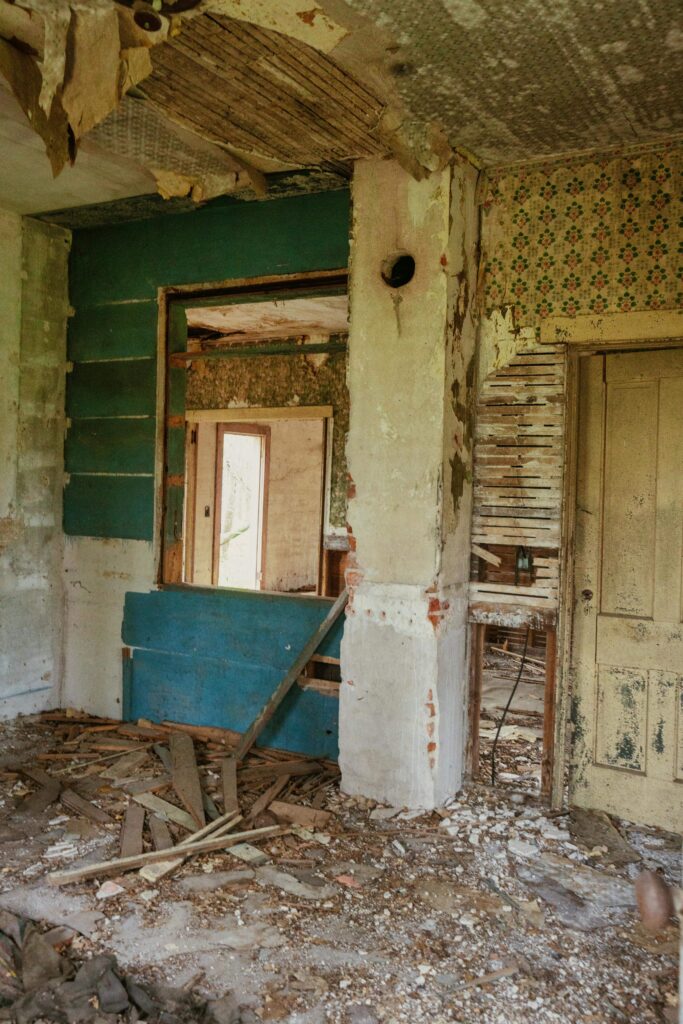Selling a home is never simple — but when your property is in poor condition or facing foreclosure, it can feel overwhelming. Many homeowners in this situation wonder what options they really have and whether anyone would be interested in buying.
If you’ve been asking yourself how to sell a distressed house, the good news is that there are practical strategies to help you move forward. Distressed properties don’t have to mean lost opportunities — with the right approach, you can protect your equity, avoid unnecessary stress, and even close faster than you might expect.
In this guide, we’ll break down everything you need to know about selling a distressed home:
What qualifies as a distressed property.
- The challenges sellers often face.
- The best ways to sell a distressed house — from listing with an agent to working with local cash buyers.
- Expert tips to help you choose the right path based on your goals and timeline.
Whether you’re dealing with foreclosure, costly repairs, or an inherited property, this article will give you a clear roadmap to move forward with confidence.
What Is a Distressed House?
A distressed house is a property that is under financial or physical strain, making it harder to sell through the traditional real estate market. These homes often fall into one of several categories:
- Foreclosure risk: When a homeowner has fallen behind on mortgage payments and the lender is preparing to take back the property.
- Severe disrepair: Houses that require major repairs or updates, from roof damage to outdated electrical systems, that many buyers can’t afford to fix.
- Liens or debt issues: Properties tied up in unpaid taxes, judgments, or contractor liens.
- Inherited properties in poor condition: Homes passed down to heirs that may have been neglected for years.
Common Signs of a Distressed Property
- Noticeable structural damage or outdated systems.
- Overgrown landscaping or poor curb appeal.
- “For auction” or “foreclosure” notices.
- Owners looking to sell quickly due to financial hardship or personal circumstances.
If you’re facing one of these scenarios, you’re not alone. Many homeowners choose to sell a distressed house directly to buyers who are willing to purchase it as-is. This can save time, avoid costly repairs, and provide a faster path to closing.
For more insight into this option, check out our guide on selling your house fast as-is
Challenges of Selling a Distressed House
While it’s possible to sell a distressed house, it comes with unique hurdles that homeowners should be prepared for:
Limited Buyer Pool
Most traditional buyers are looking for a move-in ready property. A home that needs major work often appeals only to investors, flippers, or specialized buyers, which naturally narrows your pool of potential offers.
Potential for Lower Offers
Because of the risks and costs involved, distressed homes are often priced below market value. Buyers factor in repairs, holding costs, and resale potential, which can reduce what you walk away with.
Repairs and Inspection Issues
Even if you find a traditional buyer, inspections can uncover expensive repairs. These discoveries can derail deals or lead to renegotiations that eat into your profit.
Emotional and Financial Stress
Owning a distressed property is not just a financial strain — it can be emotionally draining, too. The longer the property sits on the market, the more stressful it becomes for the seller, especially if foreclosure or debt is looming.
If repairs are the biggest barrier, you may want to weigh the costs before deciding on your selling strategy. Our blog on the cost of fixing a house in disrepair breaks down what’s worth fixing and when it’s better to sell as-is.

How to Sell a Distressed House Fast — 3 Main Options
When figuring out how to sell a distressed house, homeowners typically have three main routes to consider. Each comes with its own pros, cons, and ideal situations.
List With a Real Estate Agent
Working with an agent is the traditional path.
- Pros: You’ll get maximum market exposure, which can sometimes lead to a higher sale price if buyers are willing to take on repairs.
- Cons: It can be time-consuming, since distressed homes often sit longer on the market. You may also need to make repairs or updates before listing, and realtor commissions will reduce your net profit.
Sell to a Real Estate Investor or Cash Home Buyer
This is often the fastest way to sell a distressed house.
- Pros: Investors and local cash home buyers purchase properties as-is, meaning you don’t have to worry about costly repairs or renovations. They can also close in days, not months.
- Cons: Because they’re taking on the risk and costs, expect a lower sale price than the traditional market.
Curious why working with local buyers may be your best move? Check out our guide on why local cash home buyers are the smart choice
Try a Short Sale
If you owe more on your mortgage than your home is worth, a short sale could be an option.
- Pros: It helps you avoid foreclosure by working with your lender to accept less than the mortgage balance.
- Cons: The process requires lender approval, which can take time and may not always be granted.
For sellers navigating unique or difficult scenarios, such as probate, you may also want to read our blog on selling a house in probate
Steps to Sell a Distressed House Successfully
Even though selling a distressed property can feel overwhelming, breaking the process into clear steps makes it much more manageable. Here are the most important actions to take if you want to move forward quickly and strategically.
Get a Professional Valuation
The first step in how to sell a distressed house is understanding what your property is worth. Even in poor condition, a professional appraisal or comparative market analysis can give you a baseline value. Knowing this number helps you evaluate offers and avoid underselling.
Weigh Repair Costs vs. Selling As-Is
Not every repair adds value — and in many cases, fixing up a distressed home may cost more than it’s worth. Small cosmetic upgrades like painting or replacing hardware may help with presentation. But if your home has structural issues, outdated systems, or water damage, selling as-is might be the smarter option.
For more guidance, see our blog: Can You Sell a House That Needs Repairs?
Choose the Right Buyer for Your Situation
Who you sell to depends on your priorities.
- If urgency matters most, a cash buyer or investor is the fastest route. They’ll purchase the home as-is and close quickly.
- If you have time and flexibility, listing with a real estate agent could get you closer to full market value, though it comes with repairs, staging, and commissions.
To compare both approaches, check out our guide on selling to a cash buyer vs. listing with an agent
Benefits of Selling to a Local Cash Buyer
When you’re deciding how to sell a distressed house, working with a local cash buyer often provides the fastest and least stressful solution. Here’s why many homeowners choose this route:
Speed
Instead of waiting months on the open market, you can close in a matter of days. This is especially helpful if you’re facing foreclosure, relocating quickly, or simply want to move on without delay.
Certainty
Traditional sales depend on financing, which can fall through at the last minute. With cash buyers, there are no lender approvals or underwriting requirements — giving you peace of mind that the deal will actually close.
Convenience
Skip the open houses, repairs, staging, and realtor commissions. Local cash buyers purchase homes as-is, meaning you don’t have to sink money into renovations or spend weekends showing the property.
Learn more about why many sellers choose this option in our guide: Selling Your House to Orca Homes
Risks to Watch Out For
While learning how to sell a distressed house, it’s just as important to understand the potential risks that come with the process. Not every buyer has your best interests in mind, and being cautious can save you from costly mistakes.
Scams and Predatory Offers
Unfortunately, distressed homeowners are often targeted by scammers who make promises that sound too good to be true. Be wary of buyers who pressure you into signing contracts quickly or refuse to provide proof of funds.
Out-of-State or Hedge Fund Investors
Many large hedge funds and out-of-state investors swoop in with lowball offers, aiming to maximize their profit at your expense. Unlike local buyers, they rarely understand your community or your situation — making the process feel transactional rather than supportive.
Verify Buyer Legitimacy
Always check a buyer’s track record, reviews, and local presence. A legitimate buyer will be transparent about their process, answer your questions openly, and never ask you to cover hidden fees.
For more insight on staying safe during the selling process, check out our guide: Home Buying Scams to Avoid
Conclusion
Learning how to sell a distressed house comes down to finding the right balance between speed, convenience, and profit. While traditional listings may bring in higher offers, they often require repairs, showings, and months of waiting. On the other hand, selling directly to cash home buyers can save time, reduce stress, and give you the certainty of a fast close — even if the sale price is lower.
The best choice depends on your goals. If your priority is to maximize profit and you have time to wait, listing with an agent may be the right path. But if you need speed, flexibility, and peace of mind, a local cash buyer can provide a clear, stress-free solution.
Ready for a fair cash offer on your distressed house? Orca Homes makes the process simple, fast, and local. Contact us today to get started.
FAQs About Selling a Distressed House
What is the fastest way to sell a distressed house?
The fastest way is usually selling directly to a local cash home buyer. Unlike traditional buyers, they purchase properties as-is and can close in as little as 7 days. If speed is your priority, this option avoids repairs, inspections, and mortgage delays.
Do I need to make repairs before selling?
No. One of the advantages of learning how to sell a distressed house is realizing that repairs aren’t always necessary. Many buyers — especially investors and cash buyers — are willing to purchase homes as-is. This helps you save time and money.
Can I sell a distressed house if I’m facing foreclosure?
Yes. In fact, many homeowners choose to sell a distressed house quickly to stop foreclosure. By accepting a fair cash offer before the foreclosure process is finalized, you can protect your equity and credit score.
Will I get less money selling a distressed home?
In most cases, yes. Distressed houses usually sell below full market value because of their condition or financial situation. However, when you factor in avoided repair costs, commissions, and months of waiting, a cash sale can sometimes leave you with a similar net profit.
How do I avoid scams when selling a distressed house?
Work with local, reputable cash home buyers instead of out-of-state investors. Always verify the company, check reviews, and make sure everything is in writing. For more tips, see our guide on home buying scams to avoid




